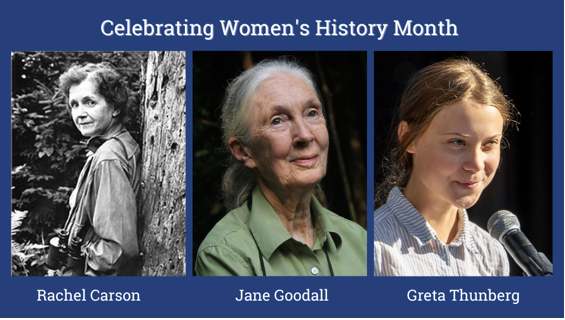During the month of March, we honor Women’s History Month and celebrate the innumerable ways generations of women have contributed to the environmental movement. Today, we recognize the contributions of Rachel Carson, Jane Goodall, and Greta Thunberg.
Rachel Carson: Born in Springdale, Pennsylvania, in 1907, Rachel Carson exemplified a love for nature from a young age. She received her education at Chatham College and Johns Hopkins University. The native Pennsylvanian wrote several best-selling books, most notably “Silent Spring,” which explored the effects of chemical pesticides on the environment and people. It detailed the government’s abuse of new chemical pesticides such as DDT and “pest” control programs. Carson is credited for alerting the American public to the dangers of agricultural pesticides.
Jane Goodall: Growing up during World War II, British scientist Jane Goodall fantasized about studying wild animals. Society largely discouraged her hopes of pursuing the sciences as a female; however, her mother, Vanne, always championed her dreams. In 1957, Goodall made her first trip to Africa, where she began studying the social habitats of chimpanzees. Today, Goodall is one of the world’s most celebrated naturalists. Aside from wildlife research, she has advocated for sustainable practices and pushed for education and anti-poverty programs for women and girls.
Greta Thunberg: Twenty-year-old environmental activist, Greta Thunberg, hails from Stockholm, Sweden. Thunberg is well-known for challenging world leaders to take action against climate change. At age fifteen, she began protesting outside the Swedish Parliament and founded the “School Strike for Climate.” Since then, she has given speeches at the World Economic Forum, before the European Parliament, and at the 2019 United Nations Climate Action Summit. Greta continues to advocate for systemic change and recently published a book, “The Climate Boom,” detailing the various crises we face and the knowledge we need to combat a climate disaster.
This article references multiple Penn State articles, found here and here.
